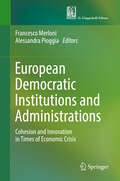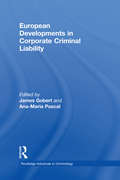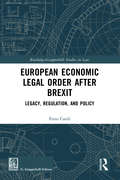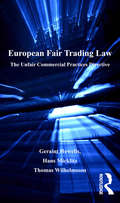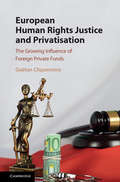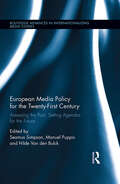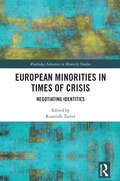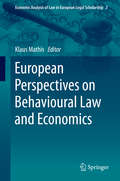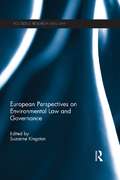- Table View
- List View
European Defence Cooperation in EU Law and IR Theory
by Tom Dyson Theodore KonstadinidesThis book offers a novel contribution to the study of post-Cold War European defence. Interdisciplinary in approach, it uses European law to assess the utility of existing theoretical accounts. By exploring the balance of threat theory, it provides new insights into the forces driving and hindering European defence cooperation.
European Democratic Institutions and Administrations: Cohesion and Innovation in Times of Economic Crisis
by Francesco Merloni Alessandra PioggiaThis book presents the results of extensive international comparative research into the effects of the economic and financial crisis on democratic institutions and social cohesion policies. The collected studies describe and analyse the measures (often referred to as "reforms") adopted to counter the crisis and the effects of these measures.It investigates three areas: the impact on the functioning of institutions, with respect to the relationship between representative institutions and governments, and the organisational structure of administrations at national and local levels; the impact that the austerity policies on public spending have on social rights; and the impact on traditional instruments of public action (administrative simplification, public services delivering, the use of common assets).The general findings highlight the effect of reducing the administrative and government capacity of the democratic institutions: the public sector, rather than being innovative and made more effective, declines, offering increasingly poor public services and making bad decisions, fuelling substantive or formal privatisation solutions, which in turn cause further weakening.
European Developments in Corporate Criminal Liability (Routledge Advances in Criminology)
by James Gobert Ana-Maria PascalWhen corporations carry on their business in a grossly negligent manner, or take a cavalier approach to risk management, the consequences can be catastrophic. The harm may be financial, as occurred when such well-regarded companies as Enron, Lehman Brothers, Worldcom and Barings collapsed, or it may be environmental, as illustrated most recently by the Gulf oil spill. Sometimes deaths and serious injuries on a mass scale occur, as in the Bhopal gas disaster, the Chernobyl nuclear explosion, the Paris crash of the Concorde, the capsize of the Herald of Free Enterprise, and rail crashes at Southall, Paddington and Hatfield in England.What role can the law play in preventing such debacles and in punishing the corporate offenders? This collection of thematic papers and European country reports addresses these questions at both a theoretical and empirical level. The thematic papers analyse corporate criminal liability from a range of academic disciplines, including law, sociology/criminology, economics, philosophy and environmental studies, whilst the country reports look at the laws of corporate crime throughout Europe, highlighting both common features and irreconcilable differences between the various jurisdictions.
European Digital Regulations (Intelligent Systems Reference Library #265)
by Markus Mueck Christophe GaieThis book offers a comprehensive exploration of the European Union's dynamic digital landscape with a specific interest on requirements for digital products to access the European Union Single Market. It delves into the latest regulations shaping the future of technology, from AI and cybersecurity to data privacy and digital markets. Currently, the European regulatory framework is indeed under substantial change with new essential requirements to be met, for example, to ensure robustness against an ever-increasing level of cybersecurity attacks. Furthermore, those requirements are likely to be taken up by other regions or will at least influence related debates, thus leading to global relevance. This book offers expert insights into European digital regulations, featuring real-world examples and case studies to help you navigate the regulatory landscape. It also provides a forward-looking perspective on emerging trends and challenges. Its content is essential for policymakers and regulators, business leaders and entrepreneurs, IT professionals and cybersecurity experts, academics and students, and concerned citizens. Whether readers are seeking to understand the implications of the AI Act, to ensure compliance with the GDPR, or to explore the potential of emerging technologies, this book provides the knowledge and tools readers need to succeed in the digital age. Finally, the authors outline how all stakeholders may engage and contribute to the implementation of the related regulations through development of so-called Harmonised Standards in the related European Standardisation Organisations.
European Drug Policies: The Ways of Reform
by Renaud Colson Henri BergeronThe drug control regime established by the international community has not succeeded in curbing either the demand for, or the offer of, narcotics. But, despite a series of developments in the Americas – including the legalisation of cannabis in Uruguay and in several states in the United States of America – there is still little support in Europe for repealing drug-prohibition laws. Nevertheless, a gradual policy convergence reveals the emergence of a European model favouring public-health strategies over a strictly penal approach to combatting drugs, while growing transnational support for legalisation indicates the persistence of an alternative paradigm for drug policy. This book examines the various influences on drug policies in Europe, as grassroots movements, NGO networks, private foundations and academic research centres increasingly confront the prevailing discourses of drug prohibition. Pursuing an interdisciplinary approach and bringing together legal scholars, social scientists and practitioners, it provides a comprehensive and critical assessment of drug policy reform in Europe.
European Economic Legal Order After Brexit: Legacy, Regulation, and Policy (Routledge-Giappichelli Studies in Law)
by Enzo CardiThis book takes an innovative approach to provide a mirror perspective of the legal systems of the UK and the EU in contemporary institutional scenarios. At the beginning of the second decade of the 21st century, the legal systems of the EU and the UK are facing challenges of epic proportions. Never before have the two legal orders been confronted with the simultaneous impact of a series of events. First, the effect of the “divorce” between the two regulatory systems caused by the UK’s withdrawal from the EU. The Negotiating Documents and the Draft Texts being discussed and aimed at leading to a `New Partnership’ are examined in the book. Second, the book discusses the impact of the coronavirus shock in all European economies leading to a substantial change of political perspective in the EU legal order implying innovative debt instruments. Third, it explores the consequences of the judicial activism of the German Constitutional Court undermining the strategic role of the European Central Bank and the primacy of the European Union Court of Justice. The book questions the effects deriving from the legacy, i.e. the foundations of the two legal systems, on handling the issues of our time, the impact on market regulation of the striking contemporary events and the unsettled consequences on policy of the current convulsing political and financial landscape. The book will be essential reading for those working in the areas of European public regulatory law.
European Economic and Social Constitutionalism after the Treaty of Lisbon
by Dagmar Schiek Ulrike Liebert Hildegard SchneiderEuropean studies frequently regard the economic and social dimensions of EU integration as diametrically opposed, maintaining that this state of affairs is beyond change. This edited collection challenges this perceived wisdom, focusing on the post-Lisbon constitutional landscape. Taking the multi-layered polity that is Europe today as its central organising theme, it examines how the social and the economic might be reconciled under the Union's different forms of governance. The collection has a clear structure, opening with a theoretical appraisal of its theme, before considering three specific policy fields: migration policy and civic integration, company law and corporate social responsibility and the role of third sector providers in public healthcare. It concludes with three case studies in these fields, illustrating how the argument can be practically applied. Insightful and topical, with a unique interdisciplinary perspective, this is an important contribution to European Union law after the Lisbon Treaty.
European Economic and Social Constitutionalism after the Treaty of Lisbon
by Dagmar Schiek Ulrike Liebert Hildegard SchneiderEuropean studies frequently regard the economic and social dimensions of EU integration as diametrically opposed, maintaining that this state of affairs is beyond change. This edited collection challenges this perceived wisdom, focusing on the post-Lisbon constitutional landscape. Taking the multi-layered polity that is Europe today as its central organising theme, it examines how the social and the economic might be reconciled under the Union's different forms of governance. The collection has a clear structure, opening with a theoretical appraisal of its theme, before considering three specific policy fields: migration policy and civic integration, company law and corporate social responsibility and the role of third sector providers in public healthcare. It concludes with three case studies in these fields, illustrating how the argument can be practically applied. Insightful and topical, with a unique interdisciplinary perspective, this is an important contribution to European Union law after the Lisbon Treaty.
European Economic and Social Constitutionalism after the Treaty of Lisbon
by Dagmar Schiek Ulrike Liebert Hildegard SchneiderEuropean studies frequently regard the economic and social dimensions of EU integration as diametrically opposed, maintaining that this state of affairs is beyond change. This edited collection challenges this perceived wisdom, focusing on the post-Lisbon constitutional landscape. Taking the multi-layered polity that is Europe today as its central organising theme, it examines how the social and the economic might be reconciled under the Union's different forms of governance. The collection has a clear structure, opening with a theoretical appraisal of its theme, before considering three specific policy fields: migration policy and civic integration, company law and corporate social responsibility and the role of third sector providers in public healthcare. It concludes with three case studies in these fields, illustrating how the argument can be practically applied. Insightful and topical, with a unique interdisciplinary perspective, this is an important contribution to European Union law after the Lisbon Treaty.
European Environmental Law (Routledge Research In European Union Law Ser.)
by Suzanne Kingston Veerle Heyvaert Aleksandra ČavoškiEU Environmental Law is a critical, comprehensive and engaging account of the essential and emerging issues in European environmental law and regulation today. Suitable for advanced undergraduate and postgraduate students, the book delivers a thematic and contextual treatment of the subject for those taking courses in environmental law, environmental studies, regulation and public policy, and government and international relations. Placing the key issues in context, EU Environmental Law takes an interdisciplinary and thematic approach to help students to better understand the implementation and enforcement of environmental law and policy across Europe. It offers an accessible overview, and links theory with practical applications that will allow students to contextualise the outcomes of legal rules and their impact on public and private behaviours. It provides a definitive account of the subject, examining traditional topics such as nature conservation law, waste law and water law, alongside increasingly important fields such as the law of climate change, environmental human rights law, and regulation of GMOs and nanotechnology.
European Environmental Law: A Comparative Perspective (Tempus Series)
by Ludwig KrämerEuropean Environmental Law pulls together the most significant material on the subject from legal and other periodicals to form an essential compendium for those wishing to study the role of law in protecting and conserving the environment. The studies are arranged in three sections which examine the Europeanisation of law and policy, analyse the application and enforcement of law and discuss the improvement of standards in Europe.
European Fair Trading Law: The Unfair Commercial Practices Directive (Markets And The Law Ser.)
by Thomas Wilhelmsson Geraint Howells Hans-W. MicklitzThe Unfair Commercial Practices Directive is the most important directive in the field of trade practices to have emerged from the EC but it builds upon European activity which has sought to regulate trade practices on both a sectoral and horizontal level. It is an umbrella provision, which uses general clauses to protect consumers. How effective this approach is and how it relates the existing acquis are fundamental issues for debate. This work provides a critical appraisal of the Unfair Commercial Practices Directive linking discussion of it to general debates about how fair trading should be regulated. It explains how the Directive fits into the existing acquis. It also examines national traditions where these are necessary to explain the European approach, as in the case of general clauses. The book will be a valuable tool for any student of consumer law seeking to understand the thinking behind the directive and how it will affect national laws. It will also influence policy makers by suggesting how the directive should be interpreted and what policy lies behind its formulation. Businesses and their advisers will use the book as a means of understanding the new regulatory climate post-the directive.
European Human Rights Case Summaries
by Barbara MensahThis book can be used together with the European Human Rights Case Locator or as a stand-alone volume. This book contains all the cases decided by the court from 1960 to 2000, set out in an informative and easy to read summary form. The majority of the cases have not previously been reported in any UK law report. The cases are listed in alphabetical order and the following information is presented in each case summary: name of the case and case number (from numbering system adopted in European Human Rights Case Locator) law report reference (if it has been reported) date of application to the Commission/Court the date of the Commission report (pre-October 1998 cases) and the date of judgment brief summary of the facts of the case Commission finding (pre-October 1998 cases) Court's decision and reasons on the substantive Articles/Protocols Court's decision on just satisfaction/damages, expenses and costs all other cases cited by the court in its decision. This book also includes a list of all the cases in chronological order with numbering, a list of cases by subject matter and a copy of the relevant articles and Protocols of the European Convention on Human Rights. This book provides a complete reference source and research tool in a single volume of all the Court's judgements.
European Human Rights Justice and Privatisation: The Growing Influence of Foreign Private Funds
by Gaëtan CliquennoisWith the decline of public funding and new strategies pursued by interest groups, foreign private foundations and donors have become growing contributors to the European human rights justice system. These groups have created their own litigation teams, have increasingly funded NGOs litigating the European Courts, and have contributed to the content and supervision of the European judgements, which all have direct effects on the growth and procedure of human rights. European Human Rights Justice and Privatisation analyses the impacts of this private influence and the resultant effects on international relations between states, including the orientation of European jurisprudence towards Eastern countries and the promotion of private and neo-liberal interests. This book looks at the direct and indirect threat of this private influence on the independency of the European justice and on the protection of human rights in Europe.
European Intellectual Property Law (European Business Law Library)
by Terence PrimeThis title was first published in 2000: European Intellectual Property is a survey and discussion of the impact of the economic principles of the European Community, upon the legal regime for the protection of intellectual property rights within the Community and the laws of its Member States. Beginning with a discussion of the issues arising from the treaty itself and the efforts of both the European Court of Justice and the European Commission through the liberalization of licensing procedures to meet these specific issues, the survey goes on to consider the attempts to achieve harmonization of national laws in the fields of trade marks, patents, industrial design and the wider efforts to create Community wide intellectual property rights.
European International Law Traditions
by Peter HilpoldInternational Law is usually considered, at least initially, to be a unitary legal order that is not subject to different national approaches. Ex definition it should be an order that transcends the national, and one that merges national perspectives into a higher understanding of law. It gains broad recognition precisely because it gives expression to a common consensus transcending national positions.The reality, however, is quite different. Individual countries’ approaches to International Law, and the meanings attached to different concepts, often diverge considerably. The result is a lack of comprehension that can ultimately lead to outright conflicts.In this book, several renowned international lawyers engage in an enquiry directed at sorting out how different European nations have contributed to the development of International Law, and how various national approaches to International Law differ. In doing so, their goal is to promote a better understanding of theory and practice in International Law.
European Investigation Order: Where the Law Meets the Technology (Law, Governance and Technology Series #55)
by Maria Angela Biasiotti Fabrizio TurchiIn the era of globalisation, cross-border crimes are becoming increasingly common. The nature of these crimes is complex, and cross-border evidence exchange is, therefore, crucial to the successful prosecution of these offences. The exchange of evidence between countries can provide invaluable assistance in solving crimes that have an international dimension. The European Investigation Order (EIO) allows judicial authorities to request evidence more quickly and easily than via traditional instruments. The EIO has become the primary legal tool for gathering trans-border evidence, replacing the traditional Mutual Legal Assistance (MLA) conventions previously used. However, the EIO is not the only pertinent legal instrument for cross-border evidence gathering within the EU. Accordingly, professionals need a clear understanding of this subject.Exchanging evidence among judicial authorities in the EU Member States presupposes two essential components. First, there must be a secure communication channel. This is provided by e-CODEX, which offers a European digital infrastructure for secure cross-border communication in the field of justice. Recently (May 30th, 2022), the e-CODEX system became the digital backbone of EU judicial cooperation in civil and criminal matters on the basis of Regulation 2022/850. To achieve effective evidence exchange via EIO/MLA legal instruments, there must also be a communication tool. This is provided by the e-Evidence Digital Exchange System, which is capable of managing any EIO/MLA procedures/instruments, from the e-Forms (EIO Annexes) to the whole business logic, on the basis of the e-CODEX system. Finally, it is essential to use a uniform standard for the representation of evidence data and metadata, so as to streamline the process and make investigations more effective, in particular when it comes to complicated criminal cases where it is key to find either correlations among different cases or to extract multiple types of data from the same inspection. The importance of cross-border evidence exchange in criminal matters cannot be overstated. This book addresses all the above-mentioned aspects, offering an up-to-date overview of scenarios in cross-border judicial cooperation from both juridical and technical standpoints.
European Labour Law
by Brian BercussonEuropean Labour Law explores how individual European national legal systems, in symbiosis with the European Union, produce a transnational labour law system that is distinct and genuinely European in character. Professor Brian Bercusson describes the evolution of this system, its national, transnational and global contexts and its institutional and substantive structures. The collective industrial-relations dimension of employment is examined, and the labour law of the EU as manifested in, for example, European works councils is analysed. Important subjects which have traditionally received little attention in some European labour law systems are covered, for example, the fragmentation of the workforce into atypical forms of employment. Attention is also given to the enforcement of European labour law through administrative or judicial mechanisms and the European social dialogue at intersectoral and sectoral levels. This new edition has been extensively updated, as the EU's influence on this area of social policy continues to grow.
European Legal Cultures in Transition
by Grødeland, Åse B. and Miller, William L. Åse B. Grødeland William L. MillerAre national legal cultures in Europe converging or diverging as a result of the pressures of European legal integration? Åse B. Grødeland and William L. Miller address this question by exploring the attitudes and perceptions of the general public and law professionals in five European countries: England, Norway, Bulgaria, Poland and the Ukraine. Presenting new findings, they challenge the established view that ordinary citizens and people working professionally with the law have different legal cultures. Their research in fact reveals that the attitudes of citizens in Eastern and Western Europe towards 'law-in-principle' are remarkably similar, whereas perceptions of 'law-in-practice' differ by country and often correlate with GDP per capita and country ranking in rule of law indices. Grødeland and Miller's innovative methodological approach will appeal to both experts and non-experts with an interest in legal culture, European integration, or European elite and public opinion.
European Legal History
by Randall Lesaffer Jan ArriensThe rediscovery of Roman law and the emergence of classical canon law around AD 1100 marked the beginnings of the civil law tradition in Europe. Between the twelfth and eighteenth centuries, a highly sophisticated legal science of a truly European dimension was developed. Since then the different European States have developed their own national legal systems, but with the exception of England and Ireland they are all heirs to this tradition of the ius commune. This historical introduction to the civil law tradition, from its original Roman roots to the present day, considers the political and cultural context of Europe's legal history. Political, diplomatic and constitutional developments are discussed, and the impacts of major cultural movements, such as scholasticism, humanism, the Enlightenment and Romanticism, on law and jurisprudence are highlighted. This contextual approach makes for a fascinating story, accessible to any reader regardless of legal or historical background.
European Media Policy for the Twenty-First Century: Assessing the Past, Setting Agendas for the Future (Routledge Advances in Internationalizing Media Studies)
by Seamus Simpson Manuel Puppis Hilde van den BulckMedia policy issues sit at the heart of the structure and functioning of media systems in Europe and beyond. This book brings together the work of a range of leading media policy scholars to provide inroads to a better understanding of how effective media policies can be developed to ensure a healthy communication sector that contributes to the wellbeing of individual citizens, as well as a more democratic society. Faced with a general atmosphere of disillusionment in the European project, one of the core questions tackled by the volume’s contributors is: what scope is there for European media policy that can exist beyond the national level? Uniquely, the volume’s chapters are structured around four key policy themes: media convergence; the continued role and position of public regulatory intervention in media policy; policy issues arising from the development of new electronic communication network environments; and lessons for European media policy from cases beyond the EU. In its chapters, the volume provides enriched understandings of the role and significance of policy actors, institutions, structures, instruments and processes in communication and media policy.
European Metropolitan Commercial Real Estate Markets
by Ed F. Nozeman Arno J. Van der VlistMetropolitan commercial real estate markets are highly influenced by global forces, the regional economy, and institutional behaviour. While descriptions of regional commercial real estate markets are well known and widespread in academic literature, this monograph goes beyond that in explaining the dynamics in and variations between European metropolitan markets. By comparing those markets on relevant indicators and through extensive data analysis, a number of explaining factors is revealed. Contributions on specific metropolitan markets with different positions within the real estate cycle illustrate not only the characteristics of the local economy and its institutions, but also urgent issues such as battling vacancy, changing retail hierarchy or managing obsolescence.
European Minorities in Times of Crisis: Negotiating Identities (Routledge Advances in Minority Studies)
by Ruairidh TarvetOver the last decade, Europe has been struggling to cope with a series of significant and challenging global crises. Dramatic scenes from the so-called migrant crises, global financial crises, the Covid-19 pandemic and the war in Ukraine have sent shockwaves across Europe’s borders and have triggered drastic and sometimes even unprecedented responses from nation states. Caught between the shockwaves and counter-measures are Europe’s national minority communities. With little say or influence in national discussions on which measures to take in response to each crisis and often situated in peripheral or border regions, it is likely that these communities have been subjected to shifts in power balances and this may have even impacted their regional, national and transnational identities. By combining various sociological and anthropological methodologies with case studies from across northern, central, eastern and southern Europe, this book stresses the importance of listening to the unique concerns of minority communities in times of crisis. Starting in the Arctic Circle and working down in a reverse C-shape through Europe, each stop along the journey visits a different national minority community, where we learn about their multicultural, multilingual and transnational lifestyles and the distinct challenges they have faced in recent years. This book will be of interest to academics and researchers working in the areas of human geography, border studies, European studies, sociology, politics, minority studies and language studies.
European Perspectives on Behavioural Law and Economics
by Klaus MathisThis anthology highlights the theoretical foundations as well as the various applications of Behavioural Law and Economics in European legal culture. By the same token, it fosters the dialogue between European and American Law and Economics scholars. The traditional neo-classical microeconomic theory explains human behaviour by using Rational Choice. According to this model, people tend to maximize the difference between expected utility and cost ("expected utility theory"). This theory includes three assumptions: (1) unbounded rationality, (2) unbounded self-interest, and (3) unbounded willpower. Behavioural Economics questions these assumptions and endeavours to render economic analysis more realistic by underpinning it with psychological insights. In recent years, the influence of Behavioural Economics on the Economic Analysis of Law has gained momentum. Behavioural Law and Economics generates a better theoretical understanding of legal phenomena and offers a multitude of applications in legislation and legal adjudication. This volume is testament to the growing and thriving Law and Economics movement in Europe. The European Law and Economics community has steadily grown and the yearly Law and Economics Conference at the law faculty of the University of Lucerne has successfully become a guiding star in the vast sky of Law and Economics.
European Perspectives on Environmental Law and Governance (Routledge Research in EU Law)
by Suzanne KingstonThis book provides a range of perspectives on some of the most pressing contemporary challenges in EU environmental law and governance from some of today’s leading European environmental academics and practitioners. The book maintains a focus on three key cross-cutting issues, each of which is carefully analysed through the lens of governance. The first theme to be addressed is that of climate change and the problems it poses for EU governance. The second issue explored concerns the challenge of integrating environmental considerations into other policy areas, as is required by the Treaty on the Functioning of the European Union and the EU’s Charter of Fundamental Rights. Finally, the third theme centres on the important challenge of improving environmental enforcement within the EU, and considers issues such as the Aarhus Convention and the evolution of the Commission’s work on implementation and enforcement throughout the past twenty years. Each of these three themes is situated within the broader ongoing debate about the changing nature of European environmental governance post-Lisbon and the ways in which developments in this area fits within broader trends in European governance theory and policy generally. European Perspectives on Environmental Law and Governance contains contributions from experts in the field including; Mary Robinson, Alan Boyle, Ludwig Kramer and Liam Cashman, and will be of interest to academics, students and practitioners of EU environmental law.

